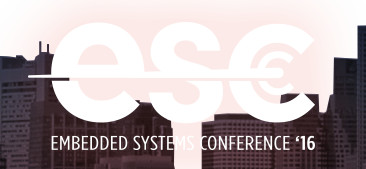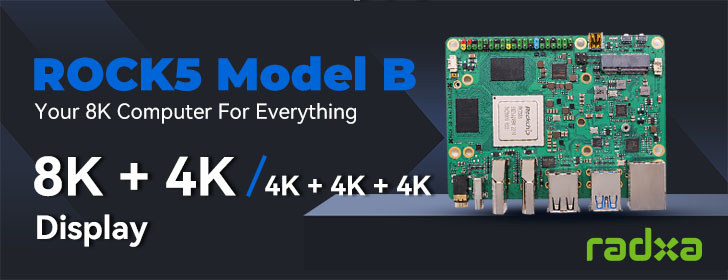The Embedded Systems Conference 2016 will take place in Boston on April 13-14, and the organizers have now released the schedule, minus some keynotes, which features four main tracks: Embedded Hardware, Embedded Software, Connected Devices and the Internet of Things (IoT), and the ESC Engineering Theatre.
As usual, I’ve gone through the list of talks and composed my own little virtual schedule which ended up with sessions focusing on power management, IoT, and security, as well some optimization and drivers development talks among others, such as patents, and the origin of Gerber files.
Wednesday 13
- 8:00 – 9:00 – Power Management in Embedded Systems by Colin Walls, Embedded Software Technologist, Mentor Graphics
The importance of power management in today’s embedded designs has been steadily growing as an increasing number of battery powered devices are developed. In this session, we will discuss design considerations that should be made when starting a new power sensitive embedded design, which include:
- Choosing the hardware with desired capabilities
- Defining a hardware architecture that will allow software to dynamically control power consumption
- Defining appropriate power usage profiles
- Making the appropriate choice of an operating system and drivers
- Choosing measurable power goals and providing these goals to the software development team to track throughout the development process.
- 9:00 – 9:45 – Creating an IoT Device in Only 45 Minutes by Jacob Beningo, Consultant, Beningo Engineering
Developing an IoT system seems extremely complex. Security, remote updating, sensor interfacing and battery life are just a few issues facing developers of connected systems. This session will reorient the embedded system engineer and expose them to an IoT platform known as the Electric Imp. We’ll walk through the design and implementation of an IoT device in 45 minutes. Attendees will gain a paradigm shift in thinking about how to design systems and be introduced to how embedded systems will be designed in the coming decade.
- 10:00 – 10:45 – Embedded Software Optimization: Architecture, Design, & Implementation by Rob Oshana, Director of SW, Freescale
This session discusses a set of techniques used in practice to optimize embedded applications for performance, memory, and power. A set of performance optimization techniques will be examined, starting with the proper mapping of software algorithm to hardware architecture, along with algorithmic transformation, C-level optimization techniques such partial summation and multi-sampling, loop unrolling and software pipelining. Practical memory optimization techniques such as data structure use and alignment, as well as power optimization techniques such as dynamic voltage frequency scaling, cache optimization and a “top ten” list of other techniques, will be discussed. This session will also cover common “optimization blockers” and how to eliminate them.
- 11:00 – 11:45 – Considerations for Security in Embedded Systems by Ahmed Refaey Hussein, Sr. Systems Architect, Mircom Group of Companies, and Khaled Loukhaoukha, Sr. Research Officer, Centre de Recherche Développement, Bouchaoui
Security has become a crucial consideration and is one of the most important design goals for an embedded system. In this session, we will introduce security in embedded systems, and provide two current approaches to security countermeasure for memory corruption and attacks. The two techniques are dynamic information flow tracking (DIFT) and same technique with secure page allocation (PIFT).
- 14:00 – 14:45 – Code Analysis Made Easy by Rafael Taubinger, Senior Field Applications Engineer, IAR Systems
The widely used C/C++ languages are known for their flexibility and proximity to hardware. However, these languages also feature a huge number of undefined behaviors and their flexibility lets you write code that may not work the way you intended; your code could be syntactically correct but nuances of the language may force the code to operate in unexpected ways. In the best case, these mistakes are detected during the development cycle, but they could easily escape into the field and necessitate a product recall. Fortunately, static- and runtime-code analysis can be integrated seamlessly into your workflow. This session will demonstrate how they can be used to detect potential errors in your application so errors can be eliminated as early and cheaply as possible.
- 15:00 – 15:45 – Real-Time Software Using Micro Python by Jacob Beningo, Consultant, Beningo Engineering
Python has become a very popular scripting language and has been deployed on many production systems in addition across multiple application domains. Micro Python is a lean and efficient Python 3 port designed to run on an ARM Cortex-M microcontroller. This session will explore real-time embedded software concepts as they relate to Micro Python.
Attendees can expect to learn key concepts in areas, such as: Python, Python vs C, Real-time Programming, Object Oriented Design, Rapid Prototyping, Controlling MCU Peripherals from Micro Python, Exception and Error Handling, and Real-Time Scheduler Concepts and Design.
- 16:00 – 16:45 – Marketing Malarkey and the Truth About Ultra-Low Power Design by Jack Ganssle, Consultant, TGG
Vendors are waging battles about their low-power microprocessors that can run on a coin cell for years. Some of what they claim is somewhat disingenuous; other claims are irrelevant. This session covers real-world data on what sort of battery life can be expected (based on millions of data points the author has gathered experimentally), what mitigation strategies are appropriate, what low sleep currents really mean, and other sources of leakages that will drain the cells long before the MCU does. The session specifically focuses on coin cell applications.
Thursday 14
- 8:00 – 8:45 – All About Patents by Bob Zeidman, President, Zeidman Technologies
This course explains all about patents including how they are written, what they protect, why you need them, and how to utilize them. It begins with a description of different kinds of intellectual property. It then explains how hardware and software companies, startup companies, and individuals can use patents to their advantage to protect their intellectual property. Finally, the course relates actual legal cases where patents have been asserted or defended, including personal experiences of the instructor as an expert witness on some of the largest cases of the last and current millennium.
- 9:00 – 9:45 – Understanding the IoT Platform Wars: Technical Trade Offs by Michael Anderson, Chief Scientist, The PTR Group, Inc.
As the Internet of Things (IoT) starts to gather momentum, a number of competing IoT platforms are jockeying for dominance. Offerings from the Thread Group (Google/Nest), Allseen Alliance (Qualcomm), Apple’s Homekit, the Open Interconnect Consortium (Intel) and many others are joining the fray. But, in this confusing array of platforms, what are the main features of each and why should you care? This session will provide an overview of these platforms, their capabilities, and barriers to entry as the industry prepares for a fight to determine the future of the 50 billion devices planned for the IoT.
- 10:00 – 10:45 – HAL Design for MCUs by Jacob Beningo, Consultant, Beningo Engineering
The speed at which a developer is expected to write software often results in device drivers that are difficult to understand, hard to maintain, and difficult to port. This session describes methods and techniques that can be used to develop a re-usable hardware abstraction layer (HAL) that is easy to maintain and use across multiple projects and platforms. It will also examine key properties of a HAL and provide examples for common MCU peripherals.
- 11:00 – 11:45 – Cryptography Basics for Embedded Developers by Eystein Stenberg, Product Manager, Mender.io
Many vulnerabilities and breaches happen due to incorrect use of cryptographic mechanisms like encryption. This session will cover the basic mechanisms of cryptography, like encryption, signatures, and key storage, looking at how these are used to create important security properties like authentication, confidentiality, and integrity.
Performance is particularly important for embedded development, and this session will cover which cryptographic operations are computationally expensive and why. It will highlight implementations of cryptographic mechanisms that help meet the performance needs of embedded devices, including Elliptic Curve Cryptography. Common pitfalls, libraries, and tools relevant for secure use of cryptography for embedded devices will also be addressed.
- 14:00 – 14:45 – The Incredible Story Behind the Gerber PCB File Format by David Gerber, Writer & Editor, Independent
The story behind the “Gerber PCB File Format” begins with H. Joseph Gerber, after whom the format was named. Gerber was a refugee who would receive the U.S. National Medal of Technology, in 1994, for his “technical leadership in the invention, development, and commercialization of manufacturing automation systems for a wide variety of industries.”
Born Heinz Joseph Gerber in Vienna, Austria, he used his inventiveness as a boy to help his family survive Nazi rule. Arriving penniless in America in 1940 with his mother, he completed a high school curriculum in just two years and college in another two, graduating with a Bachelor of Science degree in aeronautical engineering. After turning his pajamas into his first product — a “revolutionary” engineering device (now in the Smithsonian National Museum of American History) — he began his career by driving around the country to visit customer sites, selling his products by day and inventing new ones by night. Finding problems that customers did not realized they had, as opposed to simply improving existing processes, his method was to invent completely new systems of design and manufacture.
Gerber and his company refined this method in industry after industry, not only inventing new products, but also creating the supporting industrial infrastructure, often from scratch, without existing standards, compatibilities, and modularization. It is this dynamic, growing from the state of technology, the requirements of industry transformation, and the method of a remarkable inventor, that underlies the evolution of the so-called “Gerber language” in the fabrication of circuit boards.
- 15:00 – 15:45 – Applying Lessons Learned in Space FPGA Development Here on the Earth by Adam Taylor, Eur Ing, E2V
Taking the hard learned lessons from space FPGA and VHDL development and demonstrating how these can be used on the terrestrial applications to obtain a better resultant and quality for your system. This session looks at the engineering life cycle, architectures, coding structures, pitfalls around clocks and reset and mitigation techniques. While focusing upon the FPGA and VHDL structures there is also information presented on the impacts of the environment, training and development and the entire supporting facility needed for the developing a great FPGA solution on time, quality and cost.
There are two types of pass to attend the event: the conference pass and the expo pass. The latter includes access to all expo floors, four of them, and vendor sponsored training sessions, while the former adds tutorials, conference sessions, and lunch.
| CONFERENCE PASS | EXPO PASS | |
|---|---|---|
| SUPER EARLY BIRD (Ends Tuesday, December 22, 2015) |
$799 | FREE |
| EARLY BIRD (Ends Friday, February 5, 2016) |
$949 | FREE |
| ADVANCED (Ends Friday, April 8, 2016) |
$1,149 | FREE |
| REGULAR/ONSITE | $1,299 | $75 |
The expo pass is free as long as you book in advance, and the conference pass costs between $949 to $1,299 depending on how early you book your pass. Students, teachers and government officials save up to 25%, and if your company sends several people, the price drops up to 30%.

Jean-Luc started CNX Software in 2010 as a part-time endeavor, before quitting his job as a software engineering manager, and starting to write daily news, and reviews full time later in 2011.
Support CNX Software! Donate via cryptocurrencies, become a Patron on Patreon, or purchase goods on Amazon or Aliexpress




